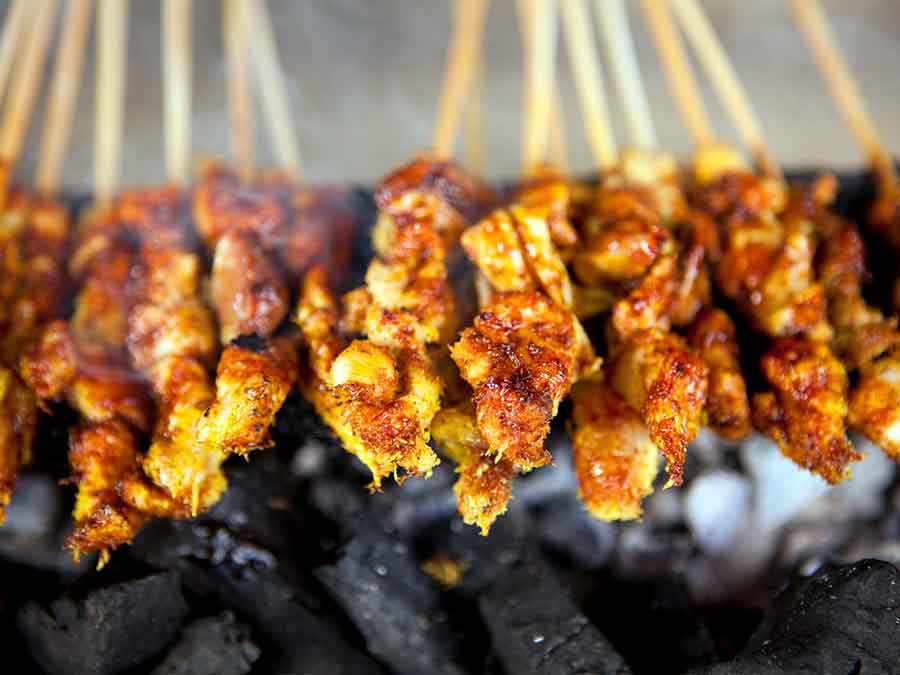
A guide to Bali’s best food
In keeping with the country’s eclectic mix of language, culture, religion and ethnicities, Indonesian food is a diverse spectrum. The rich and distinctive dishes have proved a hit throughout the world – most notably nasi goreng and satay.
There’s no substitute for tasting authentic dishes in the place of their origin, however. Even the fussiest eaters are bound to find something to delight the taste buds. Indonesia is brimming with intense flavours and aromas, whether it be in steamy street stalls or high-end restaurants.
Rice, satay and sambal: a tasty trinity
You only have to look out the window when driving through the Balinese countryside to see that rice is integral to Indonesian life. Vibrant green paddies, artfully tiered, are attractions in their own right, especially in the villages around Ubud. A pyramid of rice will accompany most dishes of meat or fish. On the predominantly Hindu island of Bali, the meat is usually pork, chicken or duck. Pork features less on the menu outside of Bali because it’s forbidden in Islam, the dominant religion throughout the rest of Indonesia. In contrast, beef is rarely involved in traditional Balinese meals due to its taboo status in Hinduism.

Whatever meat you’re served is likely to be prepared with a delicious coating of spicy satay, arguably Indonesia’s culinary emblem. There are literally hundreds of varieties of meat satay, even some made with exotic ingredients like offal or turtle. One Balinese specialty is sate lilit, minced seafood mixed with coconut and spices and moulded into patties around lemongrass skewers.
A tasty plate filled with a scoop of white rice, a meat satay and a variety of sides and condiments is called ‘nasi campur’ (literally “mixed rice”) and is the staple dish found throughout the country. A traditional Balinese nasi campur might feature a bed of rice topped with a couple of sticks of sate lilit, a hard-boiled egg, a vegetable curry, some pickles and a sambal. Sambal is the blanket name for countless variations of spicy sauce found throughout Indonesia, which add that addictive kick to just about every meal.

Peanut sauces are also integral to Indo cuisine and, just like sambal, each region has its own specialty. In Denpasar it’s ‘tipat tahu’, a delicious peanut sauce mixed with rice cake, bean sprouts, fried egg and shallots. There are lots of small roadside stalls specialising in tipat tahu in Denpasar – take your pick.
Take to the streets
Roadside stalls (warungs) are the best chance to enjoy authentic, cheap (and usually excellent) home cooking. Generally, warungs are basic shacks set up on the roadside or just outside the cook’s home and are a unique opportunity to experience traditional Indonesian hospitality. Because these are family-run eateries, sometimes language can be a challenge.
Do your research on the house specialty beforehand and be prepared to do the classic tourist ‘point and order’. One tip from the locals: arrive just before midday to catch the food when it’s freshly prepared. In terms of food safety, the temporary nature of street stalls and high selling volume means nothing is ever sitting around for too long. If in doubt, just scope the place out, watch how the food is prepared and exercise common sense.

World-class flavours
With so much excellent traditional food to sample, it’s easy to dismiss the exceptional international cuisine and world-class dining on offer in Bali’s tourist hubs. For health nuts and caffeine fiends, there’s little need to adjust your eating habits on holiday. With so many expats living here, you’ll likely find your favourites on hand. There’s trendy vegan food (and bicycles) at Peloton in Kuta, great coffee roasted and blended on the island at Revolver Espresso in Seminyak.

Up in Ubud, Copper Kitchen & Bar takes the fashionable farm-to-table philosophy and turns it into exceptional fine dining, incorporating ingredients from its own sustainable farm.
Whatever international cuisine you’re keen on, you’ll find it in Bali. There’s fine Chinese at Happy Chappy, where you can get your yum cha (tea and dim sum) fix on Sundays. Or choose tacos and tequila at Motel Mexicola, a colourful fiesta vibe in the bustling heart of Seminyak.
On that note…
Food is one of the best ways to immerse yourself in a country’s culture and lifestyle. It can be one of the most engaging and enjoyable experiences of any great holiday. In Indonesia, with the huge variety of superb eating on offer, from humble street food to fine dining, every meal is sure to leave a lasting impression.
The content of this article is general and provided for information purposes only. Southern Cross Travel Insurance (SCTI) doesn’t guarantee or warrant the accuracy, completeness or currency of any article.
This article may contain hyperlinks to other websites owned or operated by third parties, or references to third party products or services. SCTI isn’t responsible for, and makes no recommendation about, the content or accuracy of any third party website, or for the suitability or performance of any product or service. The inclusion of a link in this article doesn’t imply that SCTI endorses the website or third party product/service.





